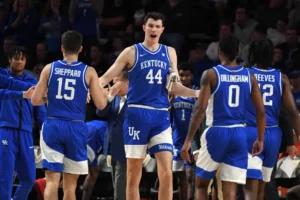Each Friday, pop pundits for The New York Times say something regarding the week's most eminent new tracks. Simply need the music? Pay attention to the Playlist on Spotify here (or track down our profile: nytimes). Like what you hear? Tell us at theplaylist@nytimes.com and pursue our Stronger bulletin, a once seven days impact of our popular music inclusion, and The Intensifier, a two times week by week manual for new and old tunes.
Olivia Rodrigo, ‘Vampire'
The main single from Olivia Rodrigo's subsequent collection opens with a phony out: “Vampire” at first has all the earmarks of being a muffled, shattered piano ditty in the vein of her 2021 crush “Drivers Permit,” however after its most memorable tune the tune fires up and kicks into a satisfyingly exaggerated, rock-operatic stuff. (She knows Billy Joel, and obviously Meat Portion, as well.) The topic — a harshly toned post-separation evaluation of a manipulative ex — remains solidly inside Rodrigo's usual range of familiarity, yet there are traces of pomposity and another feeling of underlying desire that look good for the impending “Guts,” due Sept. 8. The stanzas' loquacious, run-on conveyance is a moment sign of the songwriting voice that transformed Rodrigo into her age's everygirl, and as expected the conceded frailty makes her even more appealing: “And each young lady I at any point conversed with let me know you were terrible, awful news/You called them insane, God, I disdain the manner in which I called them insane as well.” However the tune's actual snapshot of splendor comes from that melodic ascendance in the chorale — “The manner in which you unloaded me as you dove into me, ohhhh,” she belts — when Rodrigo goes after and quickly accomplishes something past the scope of simple humans. LINDSAY ZOLADZ
‘Drivers Permit' Is an Out of control Hit. Perceive How Olivia Rodrigo Made Her No. 1 Melody.
Ad
Keep perusing the primary story
Tainy and Terrible Rabbit, ‘Mojabi Apparition'
Tainy — Marcos Efraín Masís — has been creating reggaeton hits since he was a teen. However, “Mojabi Phantom,” his most recent joint effort with Terrible Rabbit, from Tainy's new (and visitor pressed) collection “Information,” saves his typical beat for delicate edged synthesizer harmonies over a pounding walk. Awful Rabbit sings about “professing not to think about you” even while he's actually smoking, drinking and attaching; Tainy assists him with sounding more pitiful than proud. PARELES
The Equipped, ‘Game of Structure'
The Equipped has made itself a voice of off-kilter yet no-nonsense established rage since the 2010s. Like other long-running no-nonsense groups, especially Entryway, the gathering has expanded its melodic sources, perceiving electronic pop and conceding that song matters. “Game of Life” bounces among electronic maintain, full bore rock and hand-played delicacy. The melody asks an unpolished, critical inquiry: “Does anybody even know you/Does anybody even give it a second thought?” PARELES
Promotion
Keep perusing the fundamental story
Drop Out Kid, ‘We Didn't Light the Fire'
Billy Joel has a muddled relationship with his notorious 1989 megahit “We Didn't Light the Fire” — he has, in the years since composing it, referred to it as “more irritating than melodic” and compared its song to a mosquito and a dental specialist's drill — however even he ought to have another appreciation for organization in the wake of standing by listening to the cover Drop Out Kid delivered for this present week. The band endeavors a “framework update” of the track, keeping the instrumentation almost indistinguishable however changing the verses to narrative “newsworthy things from 1989-2023.” The clearest issue is the construction: For all its ludicrous juxtapositions, Joel's melody is ordered and gives a genuine feeling of social time elapsing; Drop Out Kid give us such fleeting illogical conclusions as “Fyre Fest, ‘Dark Procession'/Michael Phelps, Y2K.” Such wonderful permit may be more trivial for cunning rhythm, yet this is a tune that attempts to rhyme “Brexit” with “Taylor Quick.” The tone, as well, is a head-scratcher: Drop Out Kid's variant is neither entertaining nor sufficiently serious to make a pertinent point. Refreshing “We Didn't Light the Fire” is, at this point, a lifeless pride that has previously been improved in various organizations, from images on pandemic-period Twitter to the 1975's gnawing and more effective 2018 single “Love It Assuming that We Made It.” Joel was correct the initial time: I can't withstand anything else. ZOLADZ
Pursue The Speaker pamphlet, for Times endorsers as it were. Your option in contrast to the calculation — a genuine, live human assists you with finding melodies you'll cherish. Attempt The Enhancer bulletin for quite some time.
Geese, ‘Undoer'
Editors' Picks
Bridget Jones Merited Better. We as a whole Did.
Neutrinos Construct a Spooky Guide of the Smooth Way
Help! An English Travel Service Has Our $3,891 and We Need It Back.
The Brooklyn band Geese has packed virtually every stone style of the most recent sixty years into its collections, “Projector” from 2021 and the new “3D Country.” Prog-rock, glitz, metal, post-punk, country-rock, numbers, psychedelia, grit, field rock, roots, clamor — they all emerge some place in the fierce collection track records. The seven-minute “Undoer” is a hurling, odd-meter, snaking and uncoiling step that continues on a lively bass riff, trio percussion and an inexorably exhausted vocal from Cameron Winter. He over and over stirs himself up to cry, “It was all you!” Right? PARELES
Porch Martin highlighting Keyon Harrold, Justin Tyson and Dominique Sanders, ‘Degnan Dreams'
Eight years after the arrival of Kendrick Lamar's “To Pimp a Butterfly,” the moment exemplary LP that he helped produce, Patio Martin is presently a world-visiting maker and multi-instrumentalist. In any case, the higher he climbs, the more Martin is by all accounts diving into the dirt that supported him: the Afrocentric people group around South Focal Los Angeles. “Degnan Dreams,” Track 1 from Martin's new collection, “Tweak,” is named for a road in Leimert Park. (“Calibrate” is the first of six LPs that Martin will deliver among now and the highest point of the following year on his mark, Hints of Crenshaw.) Over a consistent, Tony Allen-contiguous drum beat from Justin Tyson, several pinching guitars, and a Dominique Sanders bass line that is pretty much as close as a cowhide glove, Martin's alto saxophone blends on a punchy design with Keyon Harrold's trumpet (and what sounds like an anonymous baritone sax) prior to floating into a gospel-touched performance, brimming with blue notes and scratched tones. RUSSONELLO
Since his 2017 presentation collection, “Cycle,” the English artist and lyricist Sampha has loaned his voice to grouped coordinated efforts. “Soul 2.0” signals another collection of his own. Over an unsteady cadence track of blipping gadgets and twofold time drumming, Sampha sings about longing, yearning, trust and consolation. “Waves will get you, light will get you/Love will get you, soul gon' get you,” he guarantees. In any case, the music keeps him suspended in midair, unsettled. PARELES
Becca Mancari highlighting Brittany Howard, ‘Don't For a moment even Concern'
In desperate times, Becca Mancari offers decided consolation with “Don't For a moment even Concern,” promising, “Give me all you got/I can deal with it,” in a whispery, pleasant voice that in some way isn't overpowered by a strong beat, a blunt string segment or Brittany Howard's vocal harmonies. “Don't stress” additionally seems like “accomplishing the work”; an individual commitment's underlined in the blend. PARELES
Hayden Pedigo, ‘Sign of Trust'
Hayden Pedigo, a guitarist from Texas, expands the folky, fingerpicking style of John Fahey, Davy Graham, Leo Kottke and a decided heredity of consonance-cherishing guitarists into the present. “Sign of Trust,” his new track, is an influencing, generally three-harmony piece that moves from 4/4 to waltz, with his acoustic guitar unobtrusively supported by high pedal-steel confirmations. It's warm, patient and elevating. PARELES
Colter Wall, ‘For quite a long time'
Ad
Keep perusing the primary story
Colter Wall might be country's most genuine follower of Willie Nelson, despite the fact that he's a baritone rather then a tenor. His curt yet insightful melodies sound affectionate, easygoing and continuous, and the lead guitar — at times multiplied by a harmonica, à la Nelson — is humble and acoustic, not electric. Wall has time, memory and anxiety at the forefront of his thoughts. “At the point when things get slow you got to go/hear that roadway cry,” he sings in “For a significant length of time,” an existential contemplation in down-home clothing. PARELES
John Raymond and S. Carey, ‘Calling'
S. Carey, a vocalist and musician long connected with Bon Iver, worked together with the trumpeter John Raymond on a collection, “Shadowlands,” due in September. In “Calling,” Carey's whispery voice drifts over a snazzy, quelled, seven beat, murmur singing about nature as disclosure: “Alert and ready to go/the fact of the matter is verdant green.” His voice is replied and afterward gives approach to Raymond's trumpet, dissolving into silent wonderment. PARELES
Boss Xian aTunde Adjuah, ‘Blood Calls Blood'
On Saturday, Boss Adjuah — the trumpeter, multi-instrumentalist and New Orleanian culture-conveyor previously known as Christian Scott — will be blessed as the Fantastic Griot of New Orleans at the Maafa Remembrance, a function in Congo Square. Congo Square is much of the time called the origination of jazz, yet Adjuah (who, in the same way as other artists, dismisses that four-letter word) would protest that depiction. It was, and stays, a hallowed ground of social maintenance, reevaluation and reestablishment. The music on Adjuah's amazing approaching collection, “Bark Out Thunder Out Lightning,” associates straightforwardly to that set of experiences, and it lacks the capacity to deal with any jazz shows. On “Blood Calls Blood,” he plays a calming, strung design on Boss Adjuah's Bow — a twofold sided stringed instrument of his own plan, melding the West African n'goni and kora with the European harp — over an encompassing foundation of whistling wind and stirring leav







